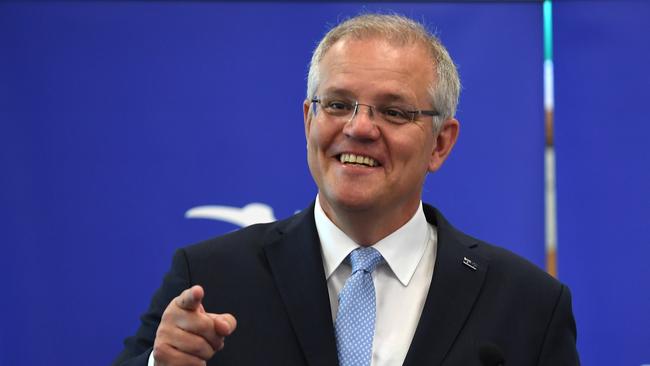Banking royal commission: banks enjoy post-Hayne bounce on sharemarket
Scott Morrison has rejected Labor’s move to wedge the government over extra sitting days to debate Hayne findings.

Soaring bank stocks drove the sharemarket to its biggest one-day rise in more than two years, as investors poured $19 billion back into the sector yesterday, relieved that Kenneth Hayne’s royal commission would not devastate the industry and there would be no immediate political backlash.
Scott Morrison rejected a Labor push for two extra parliamentary sitting weeks next month to ram through new consumer protections recommended by the former High Court judge, setting up a standoff over reform of the sector. In a move to wedge the government, Bill Shorten said the royal commission’s findings must be prioritised and warned that Australians would not accept “any further delaying tactics” from the government.

The government will next week increase pressure on the Opposition Leader to pass stalled legislation aimed at driving out underperforming funds from the $2.7 trillion superannuation savings sector, before adopting royal commission plans to establish single accounts for working Australians.
Jobs and Industrial Minister Kelly O’Dwyer yesterday said pushing ahead with Mr Hayne’s proposal to create a default super arrangement for new workers before the government’s legislation was passed risked shunting savers into underperforming funds.
She said a key test of Mr Shorten’s resolve to take action over financial-sector misconduct would be whether he backed the government’s super package, which is stalled in the Senate.
Financial stocks yesterday surged more than 5 per cent on the Australian Securities Exchange.
Shares in Commonwealth Bank — identified in Mr Hayne’s final report as the worst institutional offender with 12 breaches — rose 4.7 per cent. Westpac surged 7.4 per cent, after a bruising year in which investors heavily sold off both lenders.
AMP, the second-worst offender according to the Hayne report with nine breaches, soared 10 per cent as ANZ increased 6.5 per cent in a sector-wide rally that added $19bn to the value of bank shares.
NAB — whose chief executive Andrew Thorburn and chairman Ken Henry were urged by the Prime Minister and the Opposition Leader to consider their positions after they were singled out for criticism by Mr Hayne — rose 3.9 per cent, the smallest increase among the big banks.
Mr Morrison suggested Mr Thorburn and Dr Henry “reflect on” their positions, in an implicit endorsement of Mr Hayne’s criticism that they had not learned “the lessons of the past”.
“Commissioner Hayne was pretty sharp in his assessment and I think that gives them a lot to reflect on,” Mr Morrison said.
Opposition Treasury spokesman Chris Bowen said Mr Hayne’s report “speaks for itself” and was “far from complimentary” of NAB.
“I would expect NAB will have much more to say in response to the report. And it’s a matter for them to come up with their response to the report,” he said.
Mr Thorburn remained defiant, saying that charging fees to customers without providing any service “wasn’t dishonest, it was sloppy”.
“I don’t think we have been dishonest,” he said.
The mortgage-broking sector slumped yesterday following Mr Hayne’s proposed crackdown on the industry’s trailing commissions, worth close to $3bn a year, which the government plans to grandfather. Shares in the two largest Australian brokers, Mortgage Choice and Australian Finance Group, crashed more than 25 per cent.
The sharemarket rose above 6000 points, recording its biggest one-day rise in more than two years. Investors looked to the prospect of a revival in credit growth, as the lending sector avoided tougher recommendations on responsible-lending laws.
However, Reserve Bank governor Philip Lowe trimmed his expectations for economic growth over the coming year as official figures showed a fall in retail spending, which analysts took as evidence the weakening housing market was starting to have an impact on consumer spending.
Global ratings agency Moody’s said the fact the royal commission did not recommend breaking up the banking oligopoly supported the sector’s “strong and stable profitability”.
Framing his pitch to voters ahead of the election due in May, Mr Shorten said the Coalition was unfit to reform the sector, after voting against the royal commission 26 times in parliament and subsequently failing to apologise for blocking the inquiry.
“I ask the Australian people at the election: who do you trust to keep the banks honest? The Liberals, who wanted to cover it up, or Labor, who wanted to see the truth?” Mr Shorten said.
Mr Morrison, who claimed credit for Mr Hayne’s widely welcomed report, said he had already expressed regret at failing to call the royal commission sooner, declaring his primary focus at the time was maintaining financial-sector stability.
“Let me be frank: I called the royal commission,” the Prime Minister said. “As a government, we have been taking action on this issue from the day we were elected. Labor were in government for six years. Bill Shorten was the financial services minister, for goodness sake.”
Mr Morrison’s predecessor, Malcolm Turnbull, who belatedly established the royal commission in November 2017 under pressure from Nationals MPs, said the landmark inquiry had provided “shock treatment” to the sector and conceded he should have called it 18 months earlier.
The government, which struggles to maintain control of the House of Representatives because of its minority status, has scheduled only a fortnight of sittings for the lower house before budget week and an expected election announcement. In a letter to the Prime Minister, Mr Shorten said it was “critical” that the changes recommended by Mr Hayne were legislated as soon as possible, but the government’s “part-time sitting arrangements” made this impossible.
“Failing to (put on extra sitting days) will leave Australians in no doubt that, once again, you are putting the interests of the big banks ahead of them,” he said.



